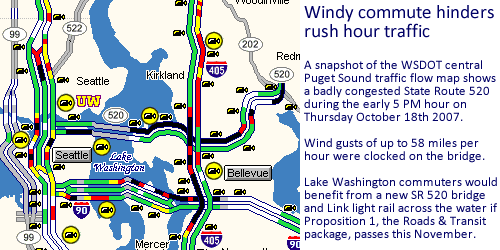This evening the Northwest Progressive Institute is pleased to announce the latest installment in our 2007 Election Podcast Series, a multimedia project intended to serve as a November ballot resource for activists and voters. The goal of this series is to examine key races and measures throughout Puget Sound and Washington State, featuring interviews with candidates, conversations with observers and citizens, roundtable discussions, and possibly even debates.

Audio will be distributed through our podcast, with transcriptions of each episode posted here on the Official Blog for those who would rather read than listen.
To subscribe to our podcast, plug our
multimedia feed into your favorite aggregator - or click the below button to do so if you are an iTunes user.

Our second episode in the series, and eighteenth episode overall, concentrates on Snohomish County, where two progressive champions - Mike Cooper and Brian Sullivan - are running for different seats to strengthen the Council's Democratic majority and make local government more responsive to the needs of the people. Click the "Listen" link to hear the episode in your browser, or read the transcribed episode below.
 ListenStrengthening the Snohomish County CouncilANDREW VILLENEUVE:
ListenStrengthening the Snohomish County CouncilANDREW VILLENEUVE: Hello and welcome to the Northwest Progressive Institute’s first podcast for October 2007, the second of a special series of Election podcasts focusing on the November ballot.
My name is Andrew Villeneuve, I’m the Executive Director for NPI, and I’m pleased to be your host for this episode. To reach us with your comments and suggestions, send a message to feedback (at) nwprogressive (dot) org. I will give you that information again at the end of this podcast.
I’m here with Mike Cooper and Brian Sullivan, who are running for different positions on the Snohomish County Council. Welcome to both of you!
MIKE COOPER: Thank you and thank you for having us.
BRIAN SULLIVAN: And thank you very much. I appreciate it.
ANDREW: I’d like to begin by asking you about the current situation on the Council – how many Democrats and Republicans are there now, and how will it look after you win - if you win?
MIKE: Well, that's actually a very good question. There are currently three Democrats and two Republicans on the County Council in Snohomish County. Two of those, one Republican and one Democrat, are going out of office and leaving the two seats that Brian and I are running for open due to term limits here in Snohomish County.
So, should be both get elected, given the conservative nature of the Democrat that occupies the seat that Brian's running for, if we both get elected, it'll be a four to one Democratic majority and a much more progressive majority in relationship to the environment and transportation-related issues, I think.
BRIAN: And other social issues, like mental health, and housing, and...I think both Mike and I look forward to working together because of our relationship both as seatmates in the state legislature and serving together in the state legislature, but also now serving at the local level.
ANDREW: Which of the current councilmembers would you say is progressive?
MIKE: Probably the most progressive (current) member of the County Council is Councilmember Dave Somers, who represents predominantly eastern Snohomish County - east of Monroe, out into the rural parts, up towards Stevens Pass. To a certain extent, [Councilmember] Dave Gossett shares some of the progressive values we care about. Councilmember [Kirke] Sievers, who's been there a number of years, [is] probably the most conservative Democrat, and certainly I wouldn't call either of the Republicans very progressive.
BRIAN: Yeah, I would agree with that, and think that there's big changes coming to the County Council on the progressive side. And I would just back up the statement that Dave Somers is probably is a leader right now, a representative of those values on the Council.
ANDREW: Could each of you briefly describe your background for us?
MIKE: Sure, you want to go first, Brian?
BRIAN: Sure. Well, my background is a long varied background, filled with public service, much like Mike's. You know, I grew up...my dad worked for a U.S. Senator, Mike Mansfield, we moved out here when I was four, he was a Kennedy appointment to run the...what today is FEMA, for Region Ten.
So I kind of grew up in the atmosphere where we sat at the dinner table and talked about if you got elected, how would you hold a district, as opposed to sports. And Walker Cronkite was daily on our agenda. I was elected to the Mukilteo City Council [when] I was twenty four years old. I was elected as Mayor of Mukilteo when I was thirty. I served eight years as the Mayor of Mukilteo. [The] population of Mukilteo was 2,000 when I started, 16,000 when I ended as the mayor.
And then of course, I went on to be elected to the state legislature...and served the last seven years in the state legislature. So I'm proud of my public record. It certainly wasn't for the money [chuckles], because there is literally no pay in all of those positions. And Mike, I know you've had a very similar background.
MIKE: I actually come from an interesting background, and I just want to preface it by saying some of the people who don't want me to be elected to the County Council call me "hyper partisan" and a "rabid, left-wing environmentalist." The interesting thing about that is that I got involved in the environmental movement after I was elected to the state legislature, not before.
In 1996, I got elected, was reelected four times, and then in 2004 gave up my seat in the state House of Representatives to run for statewide office [Lands Commissioner]. You don't get that taste out of your mouth once you've become involved (in elected office), and you also don't really get rid of the bitter taste of losing very easily.
So in 2005 I got on the county charter review commission (highest vote tally in the county!) which enabled me to be the chair of the charter review commission. [I] made up my mind during that time that I wanted to run for County Council. I knew that [Councilmember] Gary Nelson couldn't run for reelection.
And so I made up my mind to go ahead and run. Nothing made me happier...when I found out that Brian and I were both going to be running at the same time. We've got an interesting opportunity in this county because we not only served together in the Legislature when he broke the tie in 2001, but we chaired the same committee!
When I left the Legislature, Brian became the chair of the committee, the Natural Resources Committee, that I had chaired. It's going to be a joy to be up here in the county seat with Brian, and Executive Reardon, who I also served with in the House of Representatives, and...quite frankly, Republican John Koster served at the same time I did in Olympia. So it's going to be like the family will be back together again, just changing what we fight about.
ANDREW: I'd like to ask you about your vision for Snohomish County. Where do you see the county going, and what policies do you want to implement to make the county a good place to live?
MIKE: A lot of where we go, I think, depends largely on how the ballot measure on transportation [Roads & Transit] comes out in November. If that passes, the county's got an opportunity to move forward in a very progressive way on transit-oriented development and some of the kinds of things that relate to light rail. If it fails, the county really is back to square one in re-planning our transportation system in Snohomish County and how it's all going to fit together.
I have a vision of a county that really comes together around choices in transportation. And that includes our land use, that includes how we develop our parks and our schools, in addition to our strip malls and housing.
If we don't come together around choices, giving people the opportunity to walk, bike, ride the bus, ride the train, or drive their automobile, then we're not doing anybody a service in relationship to how we develop this county.
BRIAN: Both Mike and I honestly believe in the quality of life for Snohomish County, and...integrated transportation choices is certainly a part of it.
But Mike and I also come from a local background - Mike was on the Planning Commission of the City of Edmonds, I was the Mayor of Mukilteo for many years...we've dealt with the Growth Management Act, the onset of the Urban Growth Boundaries, how we integrate the environmental, or, Critical Areas Ordinances, for instance, with our planning processes....so we take a lot of experience to the county council.
But at the very top is that quality of life statement. It includes transportation, it includes growth, includes the environment, includes housing...
MIKE: One of the things (and Brian just mentioned housing) one of the things I think that's seldom discussed at the level it should be is the housing crisis that we're faced with in this county.
And I don't mean the housing crisis in relationship to people's inability to get mortgages on five hundred thousand dollar homes. I mean the housing crisis as it relates to middle income and entry-level income people trying to buy their first home or simply trying to pay their rent.
The discussion always revolves around land use, and what we really ought to be talking about is how we're going to make sure that people can rent or live in a home in this community, and slow down the phenomenon that's going on where mobile home parks are getting closed and getting turned into single-family, half a million dollar homes, and where moderately priced apartment buildings are being converted to half a million dollar condominiums.
If we don't stop that phenomenon, we're going to be in a situation here where homelessness continues to increase in the county, and our seniors, our disabled, and our low income working poor won't have the ability to have a place to live.
BRIAN: You know, Mike's absolutely right. We're expecting, in the next twelve to fifteen years, three hundred thousand people... new people... to move to Snohomish County. And...affordable and attainable housing, and housing for the homeless, is going to be critical and should be part of our planning process over the next couple years.
In fact, Snohomish County has a draft housing plan now which I've just picked up and I'm soon to share with Mike. Of course, like all programs, it's going to cost money, but I think if we're very progressive towards our housing crisis - which I honestly agree [exists] - we can get ahead of the curve...but we have to act now.
ANDREW: Brian, could you talk about your top priorities...once you're on the council, what are the first things you're going to do?
BRIAN: Well, the top two things that I've been wanting to work on, that I've talked about over and over again, and...quite honestly, is what Mike brought up earlier - one of them, anyway, and that's the housing crisis.
I really think we need to get ahead of the curve on affordable and attainable housing. We need to work out public-private partnerships...we need to pull everybody into the room.
That includes the realtors, the builders, the environmentalists, the activists...and we need to create an atmosphere so that we can start solving this housing crisis together - as opposed to, you know, sometimes in politics, the knee-jerk reactions. Another top priority of mine, of course, is mental health.
And...actually, when I was the Mayor of Mukilteo, [I] had worked on mental health issues in Snohomish County. Mukilteo is the site of a mental health facility that I supported [which] was very difficult to get past my constituents, but nonetheless, it was built, and then embraced by the community for its good work.
So...we have an opportunity to go forward on mental health, as opposed to what we've been doing for the last two decades, and that's going backwards. And that does mean, maybe additional funding, it means more programs, it means working with our nonprofit mental health organizations. So...those are really the two top priorities for me, along of course with growth.
MIKE: Brian really is - the nice thing about Brian and I is, we share a lot of common goals, and I think housing is a huge issue again that doesn't get talked about. But on a specific area of concern for me related to housing...the county went through some lengthy debates on what are referred to as "air condos".
On the surface, a good way to address the issue of density in the urban area...but there are some shortcomings as a result of what happened in the negotiations that took place between the planning commission, the county council, and the developers. And that relates to public safety.
I think we didn't pay enough attention to public safety. I'm going to ask the chair of the county council, whoever that is in January, to readdress that ordinance...make sure we talk more about our side rock requirements, our fire lane requirements, and in particular, whether or not we have fire safety sprinklers in those buildings.
And quite frankly, if I could have a dream ordinance pass, it's not one of the great things that I always talked about in the Legislature on the environment or on transportation....if I could pass any ordinance in this county, [it would be] to require every stick of new construction that's built in this county to have a fire sprinkler system when they're built.
Whether it's [a] single family residence or a whether it's warehouse. I spent twenty five years of my career dedicated to public safety. This is not something new for me. I worked on it throughout my career. But the one way to stop people from dying in fires...a fire doubles in size every two minutes. And you can save lives by having sprinklers so that that fire will go out before the people have to hear the smoke detector and before the fire department even arrives.
ANDREW: So what feedback have you received from Snohomish County residents on the campaign trail? What are people concerned about?
MIKE: When I talk to people on the street and [at] the thousands of homes I've doorbelled during this campaign, I think what they're most looking forward to is reduced traffic congestion.
Whether or not that's in the form of transit or some other thing...they consistently say, we want to see less traffic congestion. And they consistently say we want to see residential developments being built with infrastructure that goes with those developments. And that's probably one of the shortcomings of this county, is having an inability to require infrastructure.
But I think that what people are really are looking forward to is the opportunity to continue...and I say this, and some people think it's rhetoric...but I like to talk about the opportunity to provide the same quality of life that we had when my family came to this county in 1965. I just had a great opportunity last week to participate in United Way's Day of Caring, and go down to Meadowdale Park and do habitat restoration on a stream.
A stream that had fish in it in the 1930s that lost its fishery, that the fish are coming back in. And that's the kinds of things that I think that people care about that don't get talked about very openly....caring about those quality of life issues.
BRIAN: Well, you know, Mike and I both....between the two of us, have probably knocked on more than 25,000 doors. And I would agree - I think transportation is at the top of everybody's list.
But quality of life...which is really a broad term, but a necessary term, because it is about [for example] rehabilitating our streams - the big gulch project, down between Mukilteo and Edmonds, for stream restoration. Working hard to reduce noise at the county airport (at Paine Field).
And work to bring economic vitality yet maintain that environmental balance. Also, working with our schools and the school populations that we have related to growth. So...people move here for the quality of life. You know, they visit Mukilteo, they visit Downtown Edmonds, they visit Everett and the surrounding...Arlington, the beautiful farms that we have. And they move here for that.
And I think that's a big goal that both Mike and I are dedicated to meeting.
ANDREW: Can you tell our listeners where they can find more information about your campaigns?
MIKE: Sure. My website is www (dot) mikecooper (dot) org, and if you go to our website, you'll have the opportunity to click on contact, volunteer, give money, do whatever you want to do through that website. It sends an email right to me and my campaign manager, and I actually read every one of those, personally, so that's the easiest way to get a hold of us.
BRIAN: And mine is www (dot) vote (hyphen) briansullivan (dot) com. And...same thing as Mike, of course, there are plenty of links. You can donate online and contact our campaign. My campaign manager is Page DeChambeau, we both check email on a regular basis.
ANDREW: Great. Well, I want to thank the two of you for taking the time to sit down with us and talk about why you're running, and what you hope to bring to the county.
MIKE: Thank you.
BRIAN: And thank you! I appreciate it.
ANDREW: If you have questions about this episode or suggestions for future ones, send an email to feedback (at) nwprogressive (dot) org with your comments.
We hope you’ll join us again for our next episode in this special 2007 Election podcast series.
For the Northwest Progressive Institute, I’m Andrew Villeneuve. Thanks for listening.










